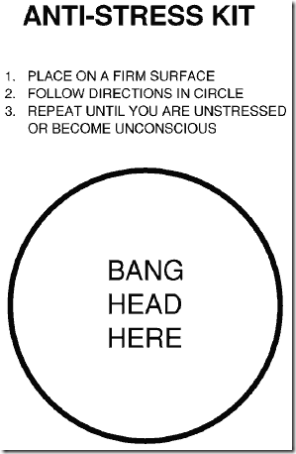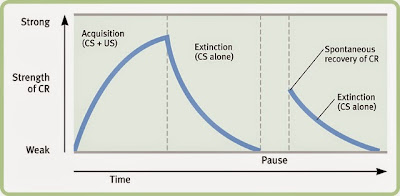In our daily lives, there are a lot of psychology concepts that we used to cope with the surroundings. As for me, as a student, I also use some of the psychology concepts or principles indirectly. In other words, I have been using the concepts since I was in the primary school and until now when I am in college without realising it.
I always heard the term "psychology" but did not know what is the actual meaning of the term. It is actually the scientific study of mental processes and behaviour. So, I can relate that it is a subject that revolves around studying human and animal nature.There are also a lot of professionals from this kind of course that deals with human problems nowadays.
First of all, one of the concepts that I have been using or experienced until now is conditioning. There was this time when I knew the teacher was nice but then the teacher become my worst nightmare. Every time I see her I feel scared even though I did not do anything bad during her class. This is because of the conditioning I have been through with her. At first, when I see her, she (NS) is nice . Then, she always scold the class for not sending her homeworks (UCS). Then, I will feel scared of her because everytime I see her (CS) I will always be scared (CR).
Next psychology concepts that has been happening in my life is the use of memory. As a student, I use a lot of my memory to cope with my studies. Sometimes, I failed to memorize certain subjects and cause myself to flunk in the examination. However, I have noticed that memory is a part of psychology. The reason why I tend to forget is because of I did not revise or always use the information I had learned in class (decay or disuse). Furthermore, there are a lot of informations that interfere with one another that make it harder for me to remember certain information (interferences). Moreover, during my years of studies, there are a few significant event that happened in my life. I could not easily forget them because the event or situation entered my long term memory without any effort (automatic encoding). There are also a few tragedy that happened in my life such as my cat died and I got "friendzoned" by my crush. It is actually called as flashbulb memory because it contains emotions and I could not forget about that memory.
Studying for your future and to achieve success will lead you to either a good stress or a bad stress. In psychology, there are terms for these stresses which are distress (bad stress) and the eustress (good stress). For me, having stress to achieve success is an eustress. I also have experience and still experience pressure like time pressure. For example, in finishing this blog hehehehe. However, it is a good stress so that I will finish writing this blog in a given time by my beautiful lecturer, Miss Nusrah :) Forgive me for not focusing on writing about stress. So, stress is a big deal to each one of us. Some of us might have stress because of catastrophe, major life changes and hassles. I have friends that are from Kelantan and they have an awful catastrophe which is a big flood had crushed their beloved hometown. Some of them could not deal with their emotion about this incident and experience stress (distress). One of the way they overcome the stress is by withdrawal which is forgetting about the incident and keep moving forward. They will have to do that in order to reduce the stress that they are experiencing at the moment.
During my studies, I have to think a lot to solve problems in life. In calculus, I have to solve the questions by using algorithms. Besides, if I have no idea how to solve the problem, I will use trial and error until I have found a solution. There was this time, when I forgot to bring my scissors to cut a piece of paper. So, without thinking of functional fixedness, I use a ruler to cut the paper. Although a ruler is used to make a straight line, but with divergent or creative thinking, you can use the ruler as anything to solve your problem.
Different people have different intelligence. That is why we are different from one another. I have a friend who always excel in his sports but does not perform well in his maths. On the other hand, I excel in maths but does not perform well in sports. It is because he has body movement intelligence while I have logical-mathematics intelligence. In total, there are 9 intelligences that people might have.
Last but not least, with psychology, I have learned that there is a reason why some of the students are explaining why they are late to class. For example, my classmates, Umar and Hakam, they are always late to class. When my lecturer asked why they are late, Hakam will say that he overslept (dispositional) but Umar will say it is because of the bus was late (situational).
Another things is, I also have done a few techniques in psychology in my daily life. For example, I did not know that all of this time I have been using the door-in-the-face technique to achieve my request. It is a technique where you want to request for a small thing but you are asking a big thing in the first place. For instance, I wanted to ask my mom for RM300 but I will know she will not give. So, I asked for RM500 at first and she will surely reject my request. After that, I will ask for RM300 which she will feel guilty for not giving me a lower request. In the end, I have achieved my desired goal. I know I am smart. Am I? Hehehehe (please do not tell my mom). Furthermore, there is another technique which is the lowball technique ( a technique where you will have to give more commitment as time goes by). For example, last year, I agree to help my sister by driving her to the book store. Then, she asked me the best book for Mathematics. After that, I have to search for the book and pay for it. Obviously, I have a very smart sister because she tricked me into helping her. In the end, I had helped her to drive to the book store, search for the book, pay for the book, treat her lunch and brought her back to home.
So, that is all from my experience that can be related to psychology. In conclusion, psychology has a lot of connections to our lives and without psychology, we wouldn't understand the nature of our lives.
Another things is, I also have done a few techniques in psychology in my daily life. For example, I did not know that all of this time I have been using the door-in-the-face technique to achieve my request. It is a technique where you want to request for a small thing but you are asking a big thing in the first place. For instance, I wanted to ask my mom for RM300 but I will know she will not give. So, I asked for RM500 at first and she will surely reject my request. After that, I will ask for RM300 which she will feel guilty for not giving me a lower request. In the end, I have achieved my desired goal. I know I am smart. Am I? Hehehehe (please do not tell my mom). Furthermore, there is another technique which is the lowball technique ( a technique where you will have to give more commitment as time goes by). For example, last year, I agree to help my sister by driving her to the book store. Then, she asked me the best book for Mathematics. After that, I have to search for the book and pay for it. Obviously, I have a very smart sister because she tricked me into helping her. In the end, I had helped her to drive to the book store, search for the book, pay for the book, treat her lunch and brought her back to home.
So, that is all from my experience that can be related to psychology. In conclusion, psychology has a lot of connections to our lives and without psychology, we wouldn't understand the nature of our lives.


































